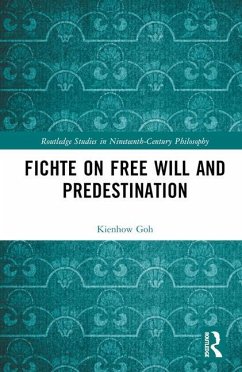The book explains Fichte's position on free will and predestination, including its rationale and significance. It argues that Fichte affirms both free will and predestination and explains how he purports to do so without contradiction.
The book presents Fichte's position as a form of compatibilism that has not yet been explored in the literature. Due to early rationalist convictions, Fichte is as much concerned with reconciling freedom with a logical and a theological determinism as he is with a causal determinism. He sees in Kant's novel concept of a pure practical reason a new form of rationalism, one consisting of a system of moral rather than natural necessitating grounds. At the same time, he adopts a more radically libertarian stance on free will than Kant. Every member in a sequence of free actions is a "first and absolute member" and could be other than it is given the same antecedent natural events and natural laws. The interest of Fichte as a theorist of freedom lies in how he brings together freedom and predetermination in a way that challenges our assumption about their mutual exclusivity. The book provides an overview of Fichte's philosophical system - the so-called "Doctrine of Science" - from 1793 to 1800 with the aim of contextualizing his theory of free agency and destiny. In doing so, it sheds light on how consideration of these issues in turn shapes the system.
Fichte on Free Will and Predestination will be of interest to scholars and advanced students working on Fichte's philosophy, the history of modern philosophy, German Idealism, and the history of the philosophical issue of free will.
The book presents Fichte's position as a form of compatibilism that has not yet been explored in the literature. Due to early rationalist convictions, Fichte is as much concerned with reconciling freedom with a logical and a theological determinism as he is with a causal determinism. He sees in Kant's novel concept of a pure practical reason a new form of rationalism, one consisting of a system of moral rather than natural necessitating grounds. At the same time, he adopts a more radically libertarian stance on free will than Kant. Every member in a sequence of free actions is a "first and absolute member" and could be other than it is given the same antecedent natural events and natural laws. The interest of Fichte as a theorist of freedom lies in how he brings together freedom and predetermination in a way that challenges our assumption about their mutual exclusivity. The book provides an overview of Fichte's philosophical system - the so-called "Doctrine of Science" - from 1793 to 1800 with the aim of contextualizing his theory of free agency and destiny. In doing so, it sheds light on how consideration of these issues in turn shapes the system.
Fichte on Free Will and Predestination will be of interest to scholars and advanced students working on Fichte's philosophy, the history of modern philosophy, German Idealism, and the history of the philosophical issue of free will.

